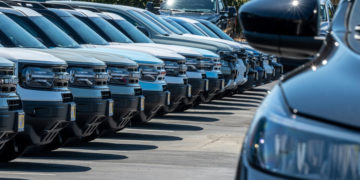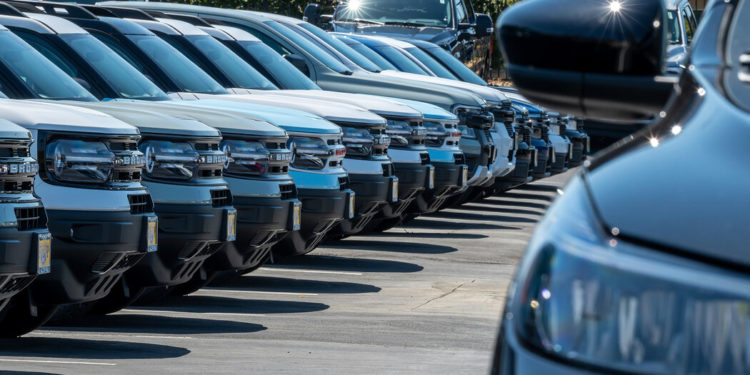The Biden administration on Wednesday granted California and 11 other states permission to ban the sale of new gasoline-powered cars by 2035, one of the most ambitious climate policies in the United States and beyond.
The widely expected move by the Environmental Protection Agency stands as one of the last steps by the administration to enact major climate policies before President Biden leaves office next month.
President-elect Donald J. Trump is expected to revoke that program soon after taking office, part of his pledge to scrap Biden-era climate policies. “California has imposed the most ridiculous car regulations anywhere in the world, with mandates to move to all electric cars,” Mr. Trump has said. “I will terminate that.”
The state, in turn, is expected to fight any revocation, setting up a consequential legal battle with the new administration.
Under the 1970 Clean Air Act, the Environmental Protection Agency has for decades granted a waiver to California, which has historically struggled with smog, to enact tougher pollution limits than those set by the federal government. Federal law also allows other states under certain circumstances to adopt California’s standards as their own.
The waiver can be used to rein in toxic, smog-causing pollutants like soot, nitrogen dioxide and ozone that lead to asthma and lung disease. But California officials have also used the waiver to curb greenhouse gases like carbon dioxide, a chief cause of global warming. Gas-powered cars and other forms of transportation are the biggest source of carbon dioxide generated by the United States.
The new waiver would allow California and 11 other states to require that any new car sold by 2035 be a zero-emissions vehicle. It would not apply to the used car market.
Earlier this year, the Biden administration finalized national auto pollution rules designed to ensure that about 56 percent of new cars sold in the United States by 2032 are all-electric, while an additional 16 percent are hybrid. But that federal rule is not a ban; gas-powered vehicles could still be sold, just in fewer numbers.
Michael S. Regan, the administrator of the Environmental Protection Agency, noted on Wednesday that California had routinely received waivers through the decades to enact tough pollution controls.
“California has longstanding authority to request waivers from E.P.A. to protect its residents from dangerous air pollution coming from mobile sources like cars and trucks,” Mr. Regan said in a statement. “Today’s actions follow through on E.P.A.’s commitment to partner with states to reduce emissions and act on the threat of climate change.”
The E.P.A. issued two waivers on Wednesday. The first limits nitrogen oxide from heavy-duty vehicles that can mix in the atmosphere to form ground-level ozone and resulting smog. The second is designed to curb emissions from gas-powered vehicles that can also form smog, soot and heat the planet. It requires carmakers to increase sales of zero emissions cars over time until they represent all sales by 2035.
California is a leader in electric vehicle adoption. The top five cities in the United States with the highest numbers of registered electric vehicles have all been in California. In 2023, electric vehicles accounted for more than 30 percent of automobile registrations in the San Francisco Bay Area, according to S&P Global Mobility, an auto market research firm. In Los Angeles, that share was close to 25 percent. This year, California surpassed two million zero-emissions vehicles sold.
While automakers have grudgingly accepted the broader Biden administration rule, many are worried about the tougher California restrictions.
While nearly 10 percent of new cars sold in the United States are all-electric, the pace of growth in E.V. sales is slowing. And that greatly concerns the automakers faced with California’s strict new rules.
“Achieving the sales mandates under current market realities will take a miracle; there needs to be balance, and some states should exit the program,” John Bozzella, the president of the Alliance for Automotive Innovation, said in a statement. The alliance represents 42 car companies that produce nearly all the new vehicles sold in the United States.
“Automakers can produce electrified vehicles, but there’s a huge gap between these E.V. sales mandates and a customer’s (reasonable) expectation they can still choose what kind of vehicle to drive,” Mr. Bozzella said.
The rules come as Mr. Trump prepares to take office after a campaign in which he attacked federal support for electric vehicles. His bid for the White House drew millions in donations from the oil and gas industry, which sees electric vehicles as a threat.
“Contrary to claims on the campaign trail that they would never tell Americans what kinds of cars we have to drive, the Biden-Harris E.P.A. just did exactly that by greenlighting California’s ban on sales of all new gas and traditional hybrid vehicles,” said Chet Thompson, the chief executive of the American Fuel and Petrochemical Manufacturers, a lobbying organization. The group ran what it called a “seven-figure” campaign against Mr. Biden’s tailpipe pollution rules.
The post E.P.A. Allows California to Ban Sales of New Gas-Powered Cars by 2035 appeared first on New York Times.



















